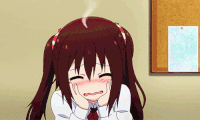|
|
"Mayadere (Western)" is a term for a character who is an antagonist of a series, but switches sides after falling in love with a protagonist. For some this may be an immediate attraction, while for others it may occur slowly over time as they develop feelings from their many confrontations.[1][2]
In Japan, this dere type is known with a completely different meaning.
Meaning of the Name
Mayadere is a combination of "Maya" (マヤ) and "deredere" (デレデレ), meaning "to be lovestruck".
Maya is a character from the best-selling shoujo manga series Glass Mask (JP). In regards to this Western variation the name has no true meaning.
Origin
It is not quite clear where the definition for this variation originates from, but it is a misunderstanding of the Japanese mayadere. The Japanese definition is "a character who puts on a scary act to hide their lovey-dovey side, but has a mask made of glass". This references the fact that their facade can easily shatter showing their more sweet vulnerable side, as well as the fact that the character Maya is an actor who embodies her characters to hide her true self.
It is likely this "scary to sweet" line made its way to the Western community and was misinterpreted as "villains are scary and when they became good they're dere, so this is what mayadere is."
Personality
Mayadere (Western) are characters that, at first, are seen as the bad guys or even the main villain. They want to screw up the plans of the heroes or even kill the protagonist in the story. As time goes by, they will become friends with the hero's team and in some cases fall in love with someone on the hero's team. They can still hold some grudges toward some of the main characters or still act like villains after this, while others can also turn completely good.
Maybe they want to join the hero team at some point or are being forced to do so, perhaps to defeat a stronger common enemy or get out of some situation, but this is usually just temporary. However, during this time, they can become attached to those on the good side. So in the future, they will be less harsh with them when returning to their antagonistic role, or at least with the person they have fallen in love with.
As most of them can be the main villain of the story, if they get to join the hero's side, another major villain will appear in the story. However, the most common thing to happen is for them to return to their position as main antagonist in future episodes after the problem is solved. If so, the character can still remain deadly and unpredictable for the protagonist or other main characters during the story. Alternatively, with time, they can also start to fake their fights to not really hurt the heroes when their dere side starts to act up. They may even do some small acts of compassion or other things to benefit the hero's team.
If they help the protagonists, they can also start to say things or act like tsundere characters, especially if the situation has forced them onto the hero's team. During the mission. they will comment from time to time that "This doesn't mean that we are friends now," and that "You should be grateful that I've decided to help you". They can also insult and make fun of the heroes even if they are working with them now. Normally, if the heroes are the only ones that need help from them they will only agree if the person they like in the group asks them personally, or is in real danger.
If they really join the hero's team, they will begin to reveal or show personalities that the heroes couldn't see when they were an enemy. They may show new ways of thinking and act more morally after the good guys teach them other ways of seeing things and acting.
Characters with this Personality
See Mayadere (Western)/Anime Characters to see characters from anime media.
See Mayadere (Western)/Western Characters to see characters from western media.
Gallery
References
| Dere Types | |||
|---|---|---|---|
| Japanese | Standard |
Bakadere ♥ Biridere ♥ Bokodere ♥ Butsudere ♥ Darudere ♥ Deredere ♥ Dorodere ♥ Erodere ♥ Gandere ♥ Goudere ♥ Gundere ♥ Himedere ♥ Hinedere ♥ Kamidere ♥ Kichidere ♥ Kiredere ♥ Kiridere ♥ Kuudere ♥ M Dere ♥ Nyandere ♥ Onidere ♥ Ojoudere ♥ Rindere ♥ Roshidere ♥ S Dere ♥ Shindere ♥ Teredere ♥ Tsundere ♥ Undere ♥ Usodere ♥ Utsudere ♥ Uzadere ♥ Wandere ♥ Yandere ♥ Yoidere ♥ Zondere ♥ | |
| Variations |
Deretsun ♥ Tsun-Aho ♥ Tsundora ♥ Tsun-Pure ♥ Tsunshun ♥ Tsuntere ♥ | ||
| Western | Standard |
Bocchandere ♥ Byoukidere ♥ Dandere ♥ Kanedere ♥ Kekkondere ♥ Nemuidere ♥ Oujidere ♥ Smugdere ♥ Teasedere ♥ Thugdere ♥ | |
| Variations |
Ahodere (Western) ♥ Kidere ♥ Mayadere (Western) ♥ Megadere (Western) ♥ | ||
| Other | |||








